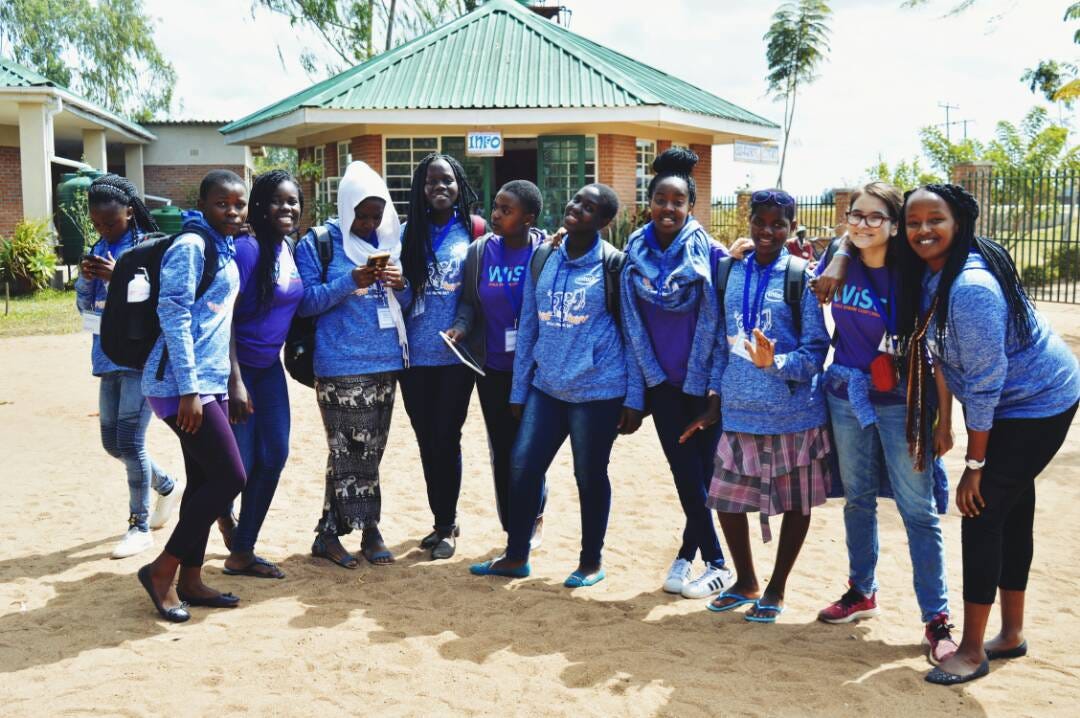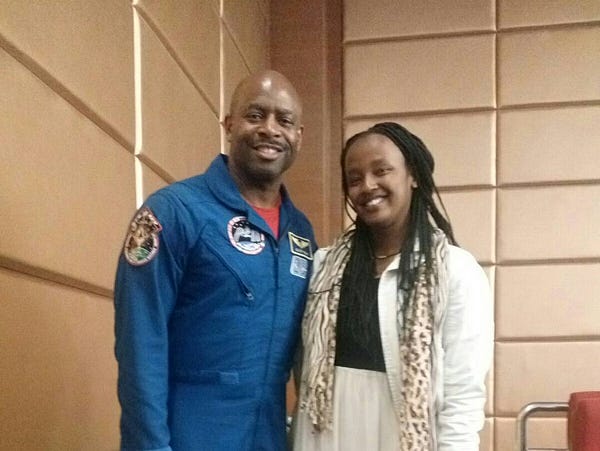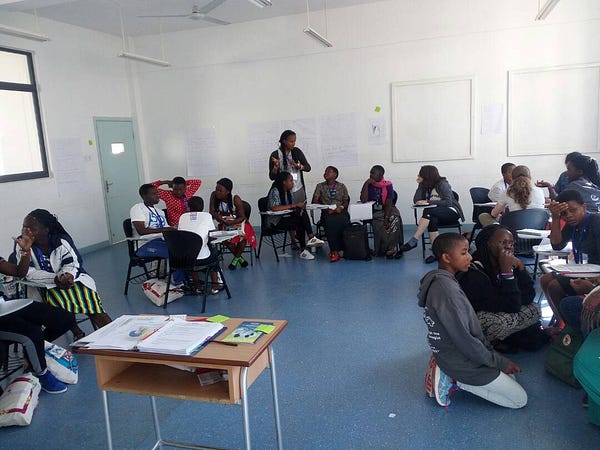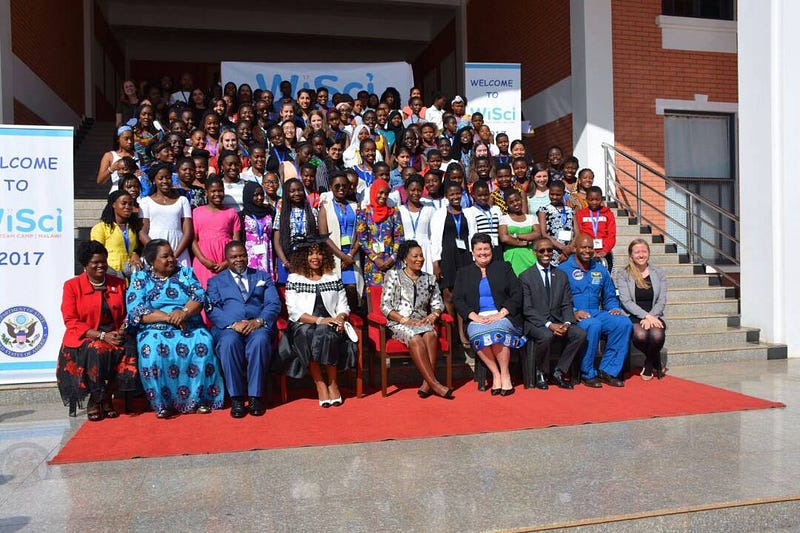Creating Change Through Technology
Akilah Institute’s Sonia Rugwiro ’17 on mentoring girls at GirlUp’s WiSci summer camp in Malawi.
“It was a spectacular experience,” Sonia Rugwiro, an Information Systems student in the Akilah Institute’s Class of 2017, laughs as she describes the three weeks she’s just spent in Malawi. Instead of relaxing during her summer break from school, Sonia traveled to Malawi to be a counselor at this year’s WiSci Girls Steam Camp, hosted by the U.S. Department of State and the United Nations Foundation’s GirlUp, which encourages girls from all over Africa and the U.S. to create positive change through technology.

Sonia (pictured, right) with camp attendees
WiSci (short for Women in Science) is a summer camp for adolescent girls to explore and experiment within the STEAM fields — an acronym for science, technology, engineering, arts, and mathematics. Every year, the camp brings together 100 girls from Malawi, Rwanda, Uganda, Liberia, Tanzania, Zambia, and the U.S. to learn about subjects like coding and mobile app development, engineering and robotics, micro- and molecular biology, satellite mapping, and sustainable development.
Girls who code
As an Information Systems student — and soon to be graduate — at the Akilah Institute, Sonia was selected to join the camp as a counselor, mentor and role model to 15- through 18-year-old girls, alongside 10 other women from Rwanda.

Sonia with former NASA Astronaut Leland Melvin
Every day for nearly three weeks, Sonia taught classes on leadership, gender in STEAM, self-confidence, and community change through technology. Through counselors like Sonia — and with support from inspiring mentors like former NASA Astronaut Leland Melvin and Malawi’s First Lady Dr. Gertrude Mutharika — the camp is designed to show girls that they can pursue degrees and careers in technology, develop their leadership potential, and build friendships and networks that will propel them to new opportunities in STEAM fields.
“Teaching those girls and being a role model to them was the best experience ever. I had so much responsibility. It made me realize that I can handle more than I thought I could.”
“Teaching those girls and being a role model to them was the best experience ever. I had so much responsibility. It made me realize that I can handle more than I thought I could. I saw myself standing in front of these girls and they were all looking up to me. I tried to find interesting ways to engage the whole class, to spark conversations, rather than just teaching a class. I made them sit in a circle, and we would discuss things openly,” Sonia says of her
first experience as a teacher and role model.

Sonia teaching a class at WiSci’s Camp in Malawi.
To prepare for her new role, Sonia pulled inspiration from the Akilah Institute’s model of teaching. “I tried to run my classes in the same way as we do it at Akilah. Our instructors don’t push us to memorize everything, but encourage us to think about how we see a certain issue. It made [my students] eager to learn in class because it was different. They would look forward to coming to class every day.”
Although she’s still a student, Sonia isn’t new to leadership roles. She’s a former Guild President of the Akilah Institute’s student body. Her experiences as President enabled her to transition into her role as counselor with confidence and familiarity. “Because of the community I have at Akilah, it wasn’t hard for me to fit into my new role. Akilah is different than other schools. Being a counselor would scare others, but the way we are here at Akilah, we are one community and one family. I brought that to Malawi. I wanted to make it a flexible community, where everyone felt safe to share their thoughts and ideas. I think it made it easier for everyone to learn and grow.”
Sustainable transformation
Since 2015, WiSci, organized in collaboration with international tech leaders Google, Intel, and NASA, has focused its efforts on creating a safer, more
prosperous, and secure digital world for women and girls. In addition to exposing girls to technology, the camp also provides the girls with teamwork opportunities, cultural exchange, educational excursions, mentorship, and professional development and networks extending beyond the camp.
According to Sonia, the combination of technology and social change was the perfect combination for her to teach, as a direct continuation of her education at the Akilah Institute. “One of the courses I taught was about the United Nation’s Sustainable Development Goals. The task was to develop projects that will help the UN solve global issues related to these goals. The girls did such cool projects! They created apps and websites, and because it’s in my field, it felt great to be able to help them. It was amazing to see how they opened up to global issues.”
And it wasn’t just the girls who were inspired to use their skills to create lasting change. The experience in Malawi changed Sonia’s perspective too. “The responsibilities I had made me grow as a person, and intellectually. The more I kept telling these girls to voice their opinions and make change in their communities, the more I understood it myself. The more I repeated it, the more it became my thing. I can’t tell these girls to make a change if I don’t do it myself,” Sonia explains.

Camp attendees and camp counselors pictured with Malawi’s First Lady, Dr. Gertrude Mutharika.
“The more I kept telling these girls to voice their opinions and make change in their communities, the more I understood it myself. The more I repeated it, the more it became my thing. I can’t tell these girls to make a change if I don’t do it myself.”
“I started thinking about what I can do to help girls more. With technology, I can create something to connect girls everywhere and help women’s empowerment, not just in Rwanda but all over the world. I can get help from others in the WiSci community — now there are so many people across the world I can call.”
And Sonia is convinced that the girls are ready to create change in their communities back home — and globally. “You go there hoping to make an impact on these girls. By the end of the day, you see a huge impact, not just for them but for yourself. You see how you grow as much as they do. We need strong women in the STEAM fields, and I think these girls can become women who make a real impact in their communities. I know they can do it. If they put their ideas into action, they will really make an impact.”
